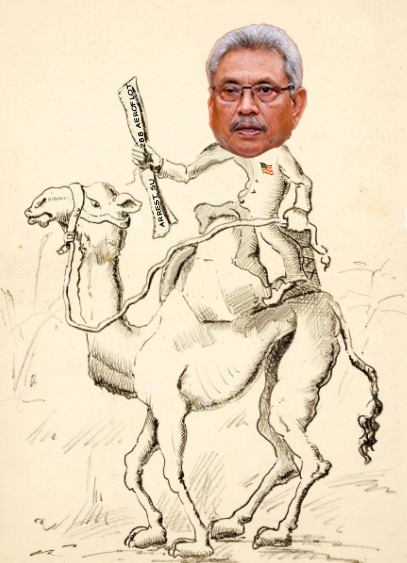

By John Helmer, Moscow
@bears_with [1]
The President of Sri Lanka, Gotabaya Rajapaksa (lead image), was toppled from power in Colombo and forced to flee the country on July 13, leaving behind a prime minister he had appointed to succeed him, assuring his immunity from prosecution and delaying national elections for two years. A week earlier, on July 6, Rajapaksa telephoned President Vladimir Putin and requested emergency shipments of Russian fuel to the country on credit because Sri Lanka had run out of fuel and also the money to pay for it.
The last Russian shipment, 90,000 tonnes of Russian crude oil to restart Sri Lanka’s sole but bankrupt refinery, had been ordered from intermediary traders and then delivered to port in May. However, the oil could not be unloaded until the government produced the cash to pay for it [2]. Rajapaksa followed in the last days of June by sending two officials to Moscow to ask for direct government-to-government oil deliveries without cash. There was no Russian agreement.
Rajapaksa’s prime minister Ranil Wickremesinghe had announced to the press that if the US or its allies in the Middle East wouldn’t agree to deliver fresh crude oil or gasoline, he and Rajapaksa would go to Moscow. “If we can get [it] from any other sources, we will get [it] from there. Otherwise [we] may have to go to Russia again,” the prime minister said [3].
Behind the scenes Rajapaksa had been trying to get Putin on the telephone for weeks, announcing publicly in Colombo he was ready to fly to Moscow. Putin’s spokesman Dmitry Peskov responded [4] publicly that no face-to-face meeting was possible. On July 6, the Kremlin agreed to take the Sri Lankan call.
Rajapaksa was desperate; Putin non-committal [5]. “Had a very productive telecon with the #Russia President, Vladimir Putin,” Rajapaksa tweeted. “While thanking him for all the support extended by his gvt to overcome the challenges of the past, I requested an offer of credit support to import fuel to #lka [Sri Lanka] in defeating the current econ challenges. Further, I humbly made A request to restart @AeroflotWorld operations in #lka. We unanimously agreed that strengthening bilateral relations in sectors such as tourism, trade & culture was paramount in reinforcing the friendship our two nations share.”
“The presidents,” reads the Kremlin communiqué [6], “discussed current matters of bilateral trade and economic cooperation, in particular, in energy, agriculture and transport… It was agreed to continue contacts at various levels.”
In Moscow the Russians interpreted Wickremesinghe and Rajapaksa to be making a public show of asking for Russian help in order to persuade Washington to rescue them instead.
The Kremlin was convinced the Sri Lankans were scheming and bluffing. The reason was that on June 2, at Colombo’s airport, an Aeroflot Airbus Flight SU-288, with more than two hundred Russians returning to Moscow from holiday in the country, had been prevented from departing; the aircraft had been stopped by an order from a judge of the Commercial High Court. Ostensibly, the court was actin [7]g on a lawsuit filed against Aeroflot by an Irish aircraft leasing company called Celestial Aviation Trading 10 Limited.
In fact, that entity was a front for AerCap [8], the dominant global aviation leasing corporation in the world, controlled by General Electric of the US; Celestial Aviation is an AerCap special purpose vehicle; its claim against the Aeroflot aircraft in Sri Lanka was part of Washington’s sanctions war — and Rajapaksa and Wickremesinghe were immediately told so by Russian officials. They claimed [9] the court order was a “commercial dispute” with “no involvement of the state”; the Russians didn’t believe them.
The aircraft was released [10] on June 6 and a court official charged with corruption [11]. But a month later, by the time Rajapaksa was appealing to Putin, Aeroflot had not restarted its flights. There would also be no Russian oil nor credit to save Rajapaksa.
In Moscow, Rajakpaksa’s downfall and his replacement by Wickremesinghe are not viewed as regime change – not yet. Russian officials are not saying whether they believe there is a continuing US plot in the country. Neither are the government officials who know best what has occurred already, and what is likely to happen next – they are the Indian government. The silence from Moscow and Delhi is telling.
Rajapaksa was a US citizen until his formal renunciation of citizenship took effect in 2020 [12]. By then Rajapaksa had been president of Sri Lanka for almost a year; for several years before, his dual citizenship [13] had been challenged in the Sri Lankan and also the US courts. He had lived and worked in the US between 1998 and 2005.
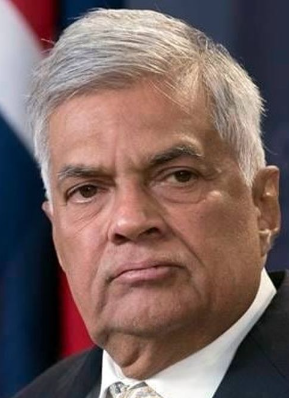
For the time being Rajapaksa has not been allowed to return to the US. The Sri Lankan Air Force flew him to the Maldives, and from there he flew on to Singapore [14]. Today, two weeks after his arrival in Singapore, there is no public report of his whereabouts. His ouster and replacement by Wickremesinghe (right) are being reported [15] in India as “the first domino to fall in America’s mythical ‘free and open Indo-Pacific’? … to starve the island’s economy from Russian oil, deepen the debt-trap and enable the IMF to set economic and trade policy in this island at the center of the Indian Ocean”.
The State Department and the Pentagon were actively courting Rajapaksa during the weeks leading up his ouster. A delegation of US officials led by Under Secretary of State Victoria Nuland and the Pentagon official in charge of Sri Lanka, Amanda Dory [16], were in Colombo on March 22-23. “You are a vital partner of the United States at a key crossroads in the Indo-Pacific,” Nuland declared [17], “and we are eager to support you at this critical moment…We share a commitment to a free and open Indo-Pacific and as the Foreign Minister said, to a rules-based, democratic, international order.” That meant US opposition to Sri Lanka’s relations with China and Russia. “I want”, Nuland emphasized, “to particularly make note of the fact that Russia’s brutal aggression in Ukraine just underscores for all of us the importance of the democracies, strengthening ourselves and standing together in the face of brutal autocratic behavior, coercion, aggression. Whether it’s coming from Russia, whether it’s coming from other autocracies around the world.”
Nuland also meant tightening US military agreements with Sri Lanka “in the security arena, which is already strong in the maritime domain, in the aviation domain. As you know, we have two US cutters which are now in service in the Sri Lankan Navy and we have another one on the way which is being outfitted now and your sailors and seamen will sail it here in the coming weeks.”
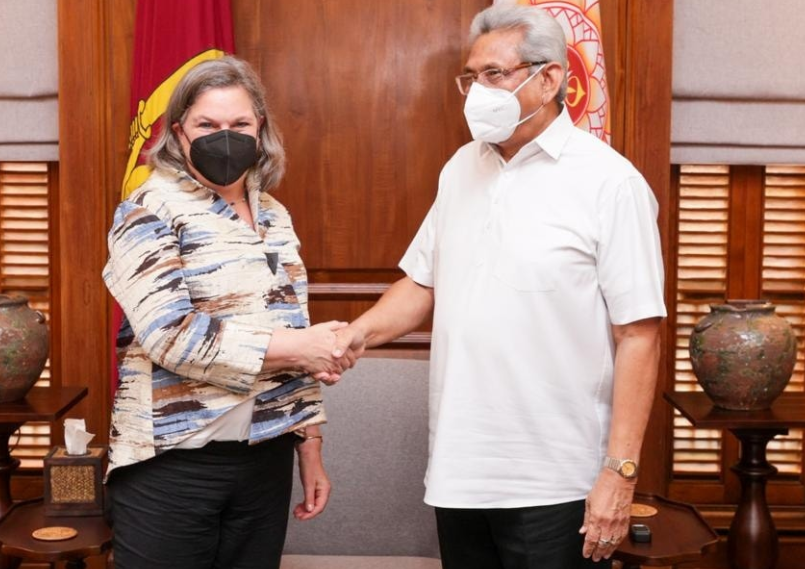
Under Secretary of State Nuland met with President Rajapaksa in Colombo on March 23 [18]. Exceptionally in their talks Nuland included the Pentagon official, Principal Deputy Assistant Secretary of Defense for Indo-Pacific Security Affairs Amanda Dory. Nuland was also accompanied at the meetings by her Washington deputy for the region and the US ambassador to Sri Lanka who are both ethnic Chinese.
In April Nuland followed with an official warning [19] that if Sri Lanka’s relationships with Russia or China crossed Nuland’s red lines, Rajapaksa would face sanctions. “Malign influence countries could displace any U.S. agreements being signed. We will mitigate this risk by staying tied in with our allies, friends and partners along with steady engagement across the Sri Lankan services to ensure the U.S. remains a partner of choice. Congressional scrutiny could limit the amount of funding available to Sri Lanka for Security Cooperation/Security assistance.”

Source: https://www.state.gov [19] -- April 6, 2022
Nuland’s strategy for the country concluded: “[to] promote a virtuousness throughout the economy which will provide a further buffer against foreign nations who wish to prey on Sri Lanka’s financial struggles and use its location astride the Indian Ocean’s major sea lanes for their own benefit.”
Rajakapsa understood the innuendoes; he missed the force of the warnings. Nuland, who in February 2014 had orchestrated the removal of Ukrainian President Victor Yanukovich for making an agreement with Moscow she didn’t approve [20], was warning Rajapaksa. He didn’t pay attention: Rajapaksa has followed Yanukovich in the second of Nuland’s career coups d’état.
Did Nuland decide Rajapaksa’s appeal to Putin in the July 6 telephone call had gone too far? Had Putin concluded Rajapaksa was too duplicitous to be worth supporting? Was the outcome of both calculations a US plot for Sri Lanka which Nuland and her subordinates control as unsteadily as they have in the Ukraine — and Moscow and Delhi know it?
Russian and Indian officials will not answer questions about the replacement of Rajapaksa by Wickremesinghe, and what they think is behind it. The day after the telephone call between the presidents, Peskov told the state news agency Tass the Kremlin would take time to study the situation before making a decision on opening a credit line for fuel exports to Sri Lanka. “Indeed, such appeals were made during yesterday’s conversation. But before we formulate any position, we still have to compare our capabilities, we have to study this issue.” It is also necessary to assess the situation with the resumption of Aeroflot flights to Sri Lanka, Peskov added [21].
He was followed [22] by a fresh quid pro quo from Alexei Tseleshchev, a Russian Embassy official in Colombo. ““Connecting Sri Lanka to the financial remittance system of Bank of Russia and introducing Mir payment system to the island would allow establishing direct financial communication and currency exchange, cutting transactional losses, and making the process of bank transfers secure and stable. The implementation of these mechanisms in Sri Lanka would have an advancing impact on the tourism industry.”
Although Russian tourist numbers to the country have been declining for several years, in January and February of this year, Russia had become the largest market for Sri Lanka’s tourism sector.
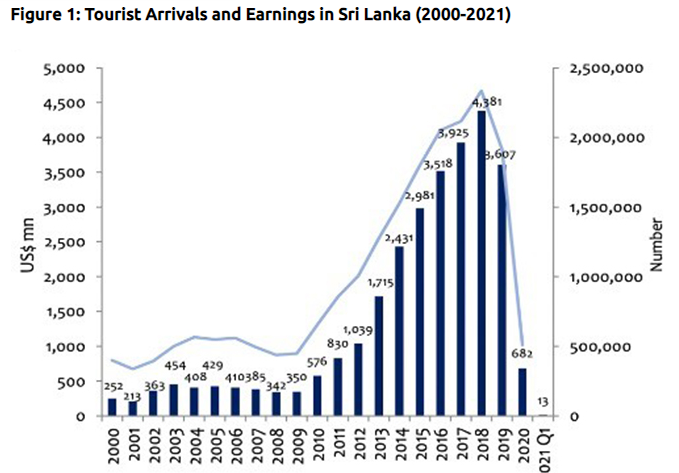
The Islamic group bombings of April 2019, followed by the Covid-19 pandemic, and then the military operation in the Ukraine have combined with the domestic economic collapse to stop tourism. Source: https://www.orfonline.org/ [23]
Tseleshchev went further [24]: “‘Sri Lanka can become a part of this process of restructuring Russian exports and obtain much-needed products. What is more, Sri Lanka may serve as a maritime hub for Russian export commodities,’ Alexey Tseleshchev said. In particular, he pointed out that Sri Lanka could gain access to critical imports such as wheat, fuel and fertilisers from Russia by playing a role in this exercise.”
A second attempt by Sri Lankan officials to negotiate rescue terms in Moscow, due between July 10 and July 16, was cancelled [25].
Indian officials are reluctant to discuss the Sri Lankan developments in private. According to a well-informed Indian source, “India is giving some aid but that is all. Indian Oil has 220 petrol stations [in Sri Lanka] but they are running dry. Same with the Chinese. Both the Chinese and Indians are waiting to see when there is political stability and they know who they can do business with.” He reports no sign of a joint Indian-Russian oil supply deal to the country.
“[Foreign Minister Subrahmanyam] Jaishankar is a Tamil. He is very keenly aware of every aspect of all the external influences. But the Indian Tamils do not want to talk about the situation now.” Jaishankar’s Twitter stream [26]has been silent on both Rajapaksa and Wickremesinghe.
The Indian High Commission in Colombo has been non-committal.
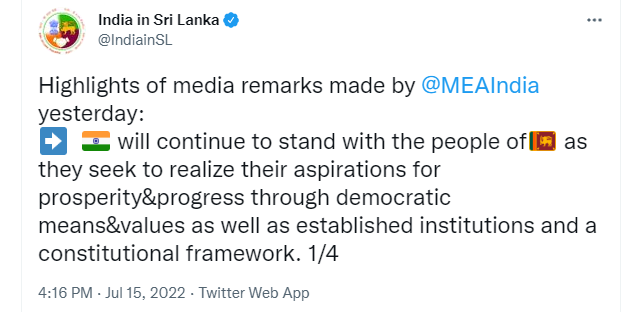
July 15 -- source: https://twitter.com/ [27]
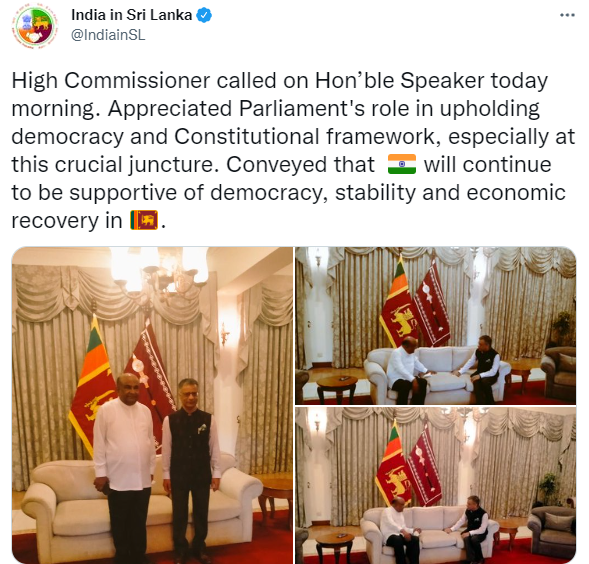
July 16 -- source: https://twitter.com/ [28]
The State Department in Washington has not commented on Rajapaksa’s ouster. US Ambassador in Colombo, Julie Chung, has had next to nothing to say. On the day of Rajapaksa’s flight, Chung tweeted twice.
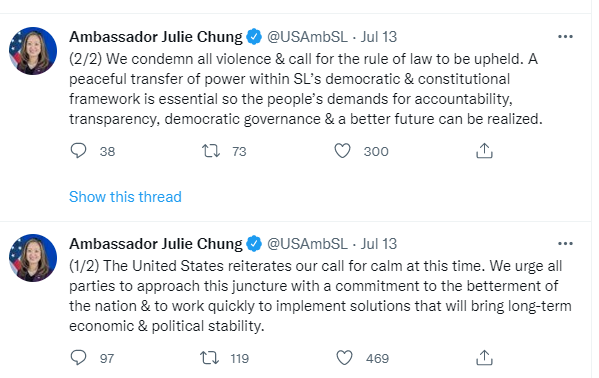
Source: https://twitter.com/ [29]
“With Gotabaya Rajapaksa’s resignation,” she tweeted [30] on July 15, two days after he had fled, “we continue to urge all parties to work together, ensure the rule of law is upheld and find solutions to the economic crisis. The US remains committed to the democratic aspirations of the Sri Lankan people.”
On July 21, mentioning Wickremesinghe by Twitter handle not by name, Chung tweeted [31]: “We look forward to working with new President @RW_UNP [Ranil Wickremesinghe] In these challenging times, it will be essential for all parties to redouble efforts to work together to tackle the economic crisis, uphold democracy & accountability, and build a stable & secure future for all Sri Lankans.”
On July 25 Putin acknowledged Wickremesinghe’s succession to the presidency, sending Ambassador Yury Materiy to Wickremesinghe with a letter [32]: “Please accept sincere congratulations on the occasion of your election as President. The Russian-Sri Lankan relations are of traditionally friendly nature. I am counting on your activities as Head of State to foster further development of the constructive bilateral cooperation in various spheres for the benefit of our peoples and in the interest of strengthening the regional stability and security. I wish you every success as well as good health and prosperity.”
The next day the Indian High Commission delivered [33] a similar letter to Wickremesinghe from Indian Prime Minister Narendra Modi.
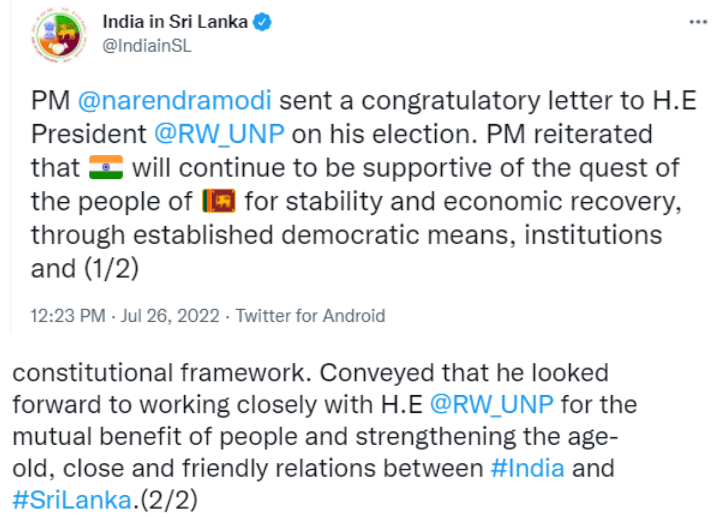
July 26 – source: https://twitter.com/ [34] and https://twitter.com/IndiainSL/ [35]
The evidence now materializing in Dublin is that the Kremlin’s suspicion of Rajapaksa and Wickremesinghe was justified; Rajapaksa’s disclaimers and last-minute remedies came too little, too unbelievable, then too late. It is not yet clear how the scheme for seizing the Aeroflot aircraft was arranged; details of the corruption charge filed against a court official involved have not been made public [10]. It is certain, however, that the orders for the operation came from AerCap’s corporate headquarters in Dublin, and that US government officials have been actively working with AerCap and General Electric, its 46% stakeholder, to pursue Aeroflot aircraft wherever US intelligence can find them.
Follow the Colombo court action from start on June 2 [7] to finish three weeks later [36].
Irish corporate registration records and the international aviation press reveal that Celestial Aviation Trading 10 Limited, the plaintiff in the Colombo court against Aeroflot, is a special purpose vehicle for AerCap.
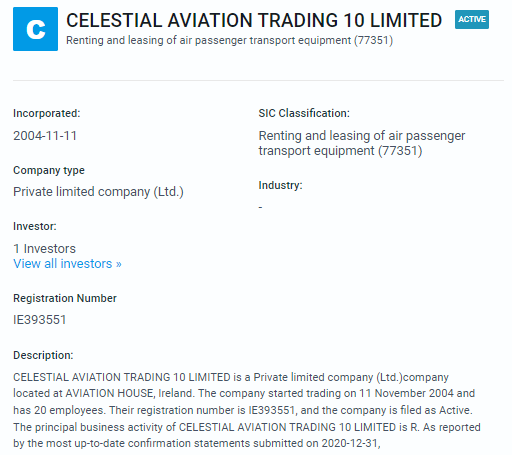
Source: https://ie.globaldatabase.com/ [37]
This company was wholly owned by General Electric’s affiliate, GE Capital Aviation Services (GECAS), the world leader in aircraft leasing until last November, when GE divested and GECAS was merged with its competitor, AerCap [38]. In combination AerCap now claims [39] to have about $70 billion in aviation assets – 1,800 aircraft, 900 engines, 300 helicopters, and 300 airline and aircraft operator customers. Listed on the New York Stock Exchange, AerCap’s current market capitalisation is $10.7 billion. But a year ago, it was double that value. The US war against Russia is killing the company’s value.
COLLAPSE OF AERCAP’S SHARE PRICE, JULY 2021-JULY 2022
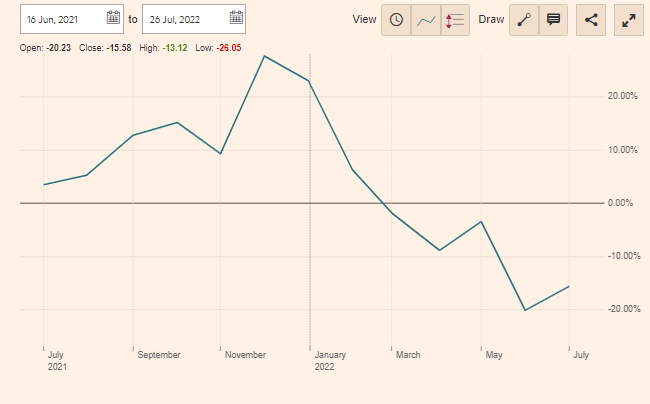
Source: https://markets.ft.com/ [40]
Financial Times of London, owned by Nikkei in Tokyo and a platform for the Japanese government’s anti-China and anti-Russia propaganda, published this week its first endorsement of the change of government in Colombo, reporting Rajapaksa’s removal as the precondition for “painful reforms to secure an IMF bailout and restructure more than $50bn of external debt… The painful reforms are a prerequisite to sealing a $3bn bailout from the IMF, which would unlock another $4bn in financing from the World Bank and the Asian Development Bank. But the severity of the crisis means that Sri Lanka is also seeking up to $1.5bn from its biggest bilateral backers — China, India and Japan — in bridge financing to immediately resume imports of fuel and gas.” This is a signal [41] that Japan, with US backing, will not allow Wickremesinghe to pursue bilateral terms with Beijing, Delhi, or Moscow.
AerCap has told its shareholders and the New York stock market that Russia is to blame. AerCap executives, whose bonuses and options depend on AerCap’s share price, are personally hostile. On May 17 [42] the company reported it had written off a $2 billion loss on its Russian operations, adding a declaration of its own war against Aeroflot: “we ceased all of our leasing activity to Russian airlines and took a charge primarily related to our aircraft and engines that remain in Russia. We have filed insurance claims related to these assets and will vigorously pursue all available remedies to recover our losses.”
In AerCap’s first-quarter report, issued a fortnight before the Colombo court case was launched, the company said: “In response to the Russian invasion of Ukraine and sanctions imposed by the United States, the European Union, the United Kingdom and other countries, we terminated the leasing of all our aircraft and engines with Russian airlines. Prior to the Russian invasion, we had 135 aircraft and 14 engines on lease with Russian airlines, which represented approximately 5% of AerCap’s fleet by net book value as of December 31, 2021. We have removed 22 aircraft and 3 engines outside of Russia, and 113 aircraft and 11 engines remain in Russia.”
“During the first quarter of 2022, we recognized a pre-tax charge of $2.7 billion ($2.4 billion aftertax) to our earnings, comprised of flight equipment write-offs and impairments, which were partially offset by the de-recognition of lease-related assets and liabilities. We recognized a total loss on our assets that remain in Russia and Ukraine and impairment losses on the assets we have recovered from Russian and Ukrainian airlines. We had letters of credit related to our aircraft and engines leased to Russian airlines as of February 24, 2022 of approximately $260 million, confirmed by nine financial institutions in Western Europe. We have presented requests for payment to all these institutions. To date, we have received payments of $210 million related to these letters of credit. We have initiated legal proceedings against one financial institution which rejected our payment demands in respect of certain letters of credit…We have submitted an insurance claim for approximately $3.5 billion with respect to all aircraft and engines remaining in Russia and intend to pursue all of our claims under these policies with respect to our assets leased to Russian airlines as of February 24, 2022. However, the timing and amount of any recoveries under these policies are uncertain and we have not recognized any claim receivables as of March 31, 2022 [43].”
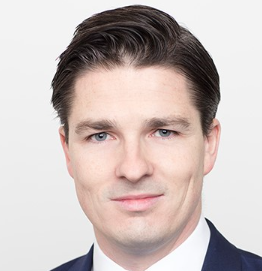
AerCap executives in Dublin were unprepared to answer press questions about their involvement in the attack on Aeroflot in Sri Lanka. Joseph McGinley (right), AerCap’s investment relations spokesman, claimed at first there is no relationship or association between Celestial Aviation and AerCap. When challenged that the Irish corporate records show otherwise, McGinley cut the telephone line.
AerCap’s media spokesman Gillian Culhane was then asked to clarify the relationship between Celestial Aviation and AerCap. She was also asked to say what involvement AerCap had had in the Colombo court application to arrest the Aeroflot aircraft, and whether the legal action had been authorized by AerCap. She acknowledged AerCap’s involvement, noting: “To your question on Celestial Aviation, we do not comment on ongoing legal proceedings.” Culhane knew the court case in Colombo had ended a month earlier with dismissal of the AerCap claim and Aeroflot’s counter-claim. [36]
Sergei Lavrov, Russia’s Foreign Minister, served in Colombo on his first career posting abroad, and he was fluent in Sinhala. On his last visit to the country in January 2020, a Sri Lankan reporter asked [44] him: “there is a concern that there is a proxy war in Iraq between the US and Iran. Could that happen here in Sri Lanka? Could there be a proxy war in Sri Lanka between the US and China, taking into consideration the focus on Sri Lanka right now from the international community?”
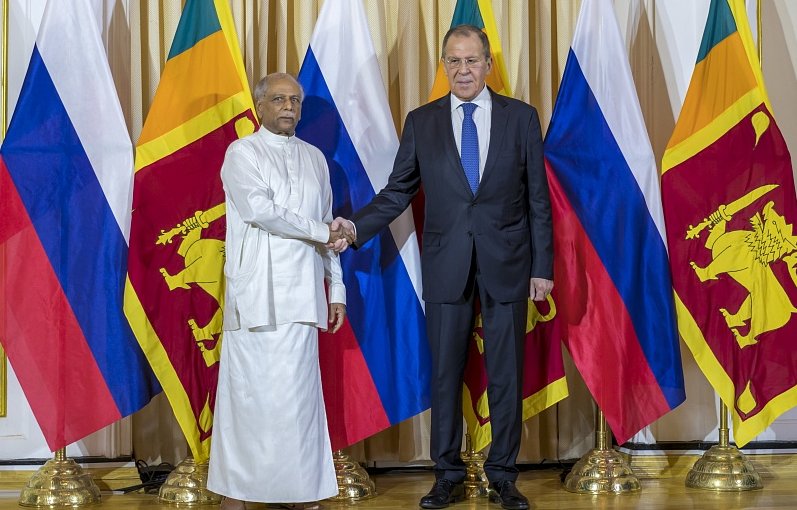
Foreign Ministers Dinesh Gunawardena and Sergei Lavrov in Colombo, January 14, 2020. Source: https://mid.ru/ [44]
Lavrov replied [44]: “Needless to say, nobody can be satisfied with what is happening in the Gulf area, where nervous tensions are heightening and are already affecting actual actions that lead to the loss of human life. Of course, we cannot ignore the fact that everything started from the moment when the United States said unequivocally that all troubles of the region without exception are triggered by Iran, that Iran is the main terrorist (although nobody can prove this), and that Iran should stop exerting influence on anything that is happening around its borders.”
“In parallel, the United States walked out on its commitments under the Joint Comprehensive Plan of Action (JCPOA) on Iran’s nuclear programme and began to impose sanctions on all those who conducted legitimate trade with Iran, which also escalated tensions. Washington’s illegal actions reached their peak with the murder of Qassem Soleimani, an official representative of the Iranian Government who was on a visit to neighbouring Iraq. This is beyond international law and humanism.”
“We are against the escalation of tensions no matter where they emanate from. We are not going ‘to intervene,’ as you said, in US-Iran relations, if you mean physical action by this word. We are calling on the United States and Iran to display restraint and resolve all problems through dialogue. As far as I understand, the US is saying it is ready for dialogue with Iran but ‘without any preconditions,’ although what it calls suffocating sanctions against Iran are ramping up during proposals on such dialogue. It so happens that while inviting Iran to dialogue without preconditions, the United States itself lays them out by subjecting Iran to pressure via sanctions.”
“We understand the concern of Sri Lanka over the negative consequences of the conflict in the Gulf area, which may affect exports of traditional goods. However, your producers will not be the only victim. The Gulf has many transport routes that are of strategic importance for the global trade of many goods, including energy sources. Therefore, it is in our common interests to build trust in the Gulf and beyond. This is the aim of the Russian proposal that we again presented at a special conference in Moscow last September. I am referring to the start of efforts to create a collective security system in the Gulf and around it.”
At the time, Lavrov said, he and Gunawardena had discussed increasing Russian military and intelligence cooperation with Sri Lanka; participation of the Sri Lankans in the Shanghai Cooperation Organization [45], and support at the United Nations “for their traditional support of Russian initiatives at the UN General Assembly on the unacceptability of glorification of Nazism.” They continued to talk on these issues and on Russian financial aid when Gunawardena last spoke with Lavrov by telephone on June 7, 2021 [46]. He was removed by Rajapaksa a few weeks later.
Last week on July 22, Gunawardena [47], a friend of Wickremesinghe since childhood, returned as Wickremesinghe’s prime minister. Russian and Indian officials are watching how their plan for suppressing opposition across the country, and Nuland’s plan for their alliance with the US, will turn out.
NOTE: Kommersant has reported [48] the unusual manipulation of Sri Lanka’s presidential constitution to arrange Rajapaksa’s succession without a national election until September 2024. This interval is “the unexpired period of the term of office of the President vacating office” – it is provided for by Section 40((a) of the Constitution [49]. But a parliamentary impeachment vote, reviewed by the Supreme Court and triggering a prompt national election, has also been an alternative under Section 38. Avoiding this is what Rajapaksa, Wickremesinghe, and Gunawardena have just pulled off, with backing from US Ambassador Chung in Colombo and Nuland in Washington.
This scheme, and the abuses of power it exposes the country to, began in mid-1977 when then-prime minister J.R. Jayewardene -- uncle to Wickremesinghe and his political patron -- invited me to advise his cabinet on how to transform Sri Lanka's parliamentary system. That had been inherited from British colonial Ceylon. Jayewardene told me he was thinking of a presidential system along American lines; in fact, he had already decided, but he wanted a consultant familiar with both systems. At the time Sri Lanka’s Ambassador to the US, W.S. Karunaratne, and I were friends; he arranged the advisory mission. It was managed by the Sri Lankans to sidestep US Ambassador in Colombo, Howard Wriggins. My interview and study process concluded with a report on the pros and cons of the change, including the problem of political accountability. At the send-off dinner in Colombo the cabinet ministers presented me with a red-leather and gilt copy of the new presidential constitution they had drafted. I asked them to sign their names. When I last checked, more than half of them had died before their time in the inter-communal, ethnic, and religious violence which has wracked the country since February 1978. Once the presidency was inaugurated and the parliamentary system for bargaining between the Buddhist majority and the Tamil, muslim (Moor) and Christian (Burgher) minorities was replaced, military dictatorship under Section 155 of the Constitution, the president’s public security and state of emergency powers, became inevitable.